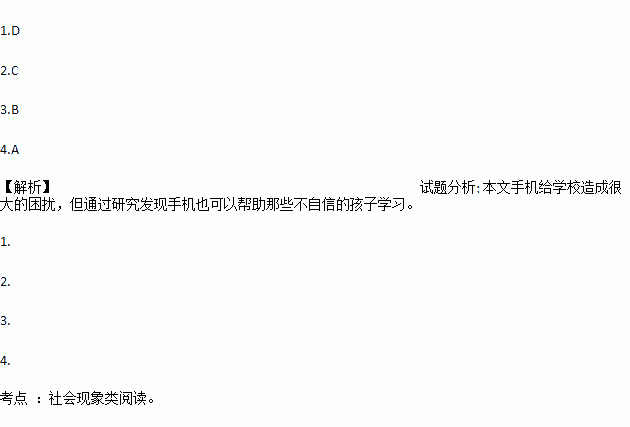题目内容
Ask a teacher to name the most annoying invention of recent years and they will often mention the mobile phone. Disturbed by the problems they create, many head teachers have ordered that pupils should keep their phones switched off at school. Others have told pupils to leave them at home.
However, education researchers at The University of Nottingham believe it is time that phone bans were reassessed, because mobile phones can be a powerful learning aid, they say. Dr Elizabeth Hartnell-Young and her colleagues have reached this conclusion after studying the consequences of allowing pupils in five secondary schools to use either their own mobile phones or the new generation of ‘smartphones’ in lessons.
During the nine-month experiment, 14- to 16-year-old pupils used the phones for a wide range of educational purposes, including creating short movies, setting homework reminders, recording a teacher reading a poem, and timing experiments with the phones’ stopwatches. The smartphones, which could be connected to the Internet, also allowed pupils to access revision websites, log into the school email system, or transfer (转存) electronic files between school and home.
The research involved 331 pupils in schools in Cambridgeshire, West Berkshire and Nottingham. “At the start of the study, even pupils were often surprised at the thought that mobile phones could be used for learning,” Dr Hartnell-Young said. “After their hands-on experience, almost all pupils said they had enjoyed the project and felt more inspired.”
Some teachers found that pupils who lacked confidence gained most from the project. However, they recognised that greater use of mobile phones in schools could cause problems.
1.We can infer from the first paragraph that .
A. teachers are strongly against students owning mobile phones
B. mobile phones should be developed to meet students’ needs
C. students are free to use their mobile phones at school
D. mobile phones are usually forbidden to be used at school
2.When the students first used mobile phones for learning, they .
A. all enjoyed the project very much
B. didn’t know what they were used for
C. didn’t fully realize the learning functions of mobile phones
D. were surprised that they were allowed to use mobile phones in schools
3.Who benefited most from the project?
A. Older pupils. B. Pupils who were not confident.
C. Younger pupils. D. Pupils who were confident.
4.The purpose of the text is to tell us that .
A. mobile phones can actually help students learn
B. mobile phones begin to be widely used in schools
C. too much use of mobile phones in schools can cause problems
D. the mobile phone is considered the most annoying invention of recent years
In the world nothing is more important than health. If people took away our money, houses, cars, or even our clothes, we could still survive. 1. Then how can we keep healthy?First of all, we should eat healthily. I usually avoid eating food high in fat, like French fries or cookies, which are junk food. 2.I only eat little meat. 3. It helps us build a strong body. Regular exercise is an important part of keeping me healthy. In addition, I think friends are an important part of one’s health. 4.I always feel better when I am with friends than when I am alone. When I am with my friends, I always laugh. Laughing is also an important part of health. It is good to stay with my friends.By eating properly and exercising regularly, I can keep my body at a proper weight and keep healthy. By spending time with my friends, I can keep my mind as well as my body happy. These things sound easy to do, but not many people can manage them. 5.
A. What’s more, taking exercise is very important. |
B. Some people appear fat because they often eat too much. |
C. I think a strong will is necessary if we want to keep fit. |
D. I eat a lot of vegetables and fresh fruits which are full of vitamins. |
E. There are some people who like staying alone, but they keep healthy. |
F. But if our health were taken away, we could surely die. |
G. Many studies show that people with few friends often get sick. |

